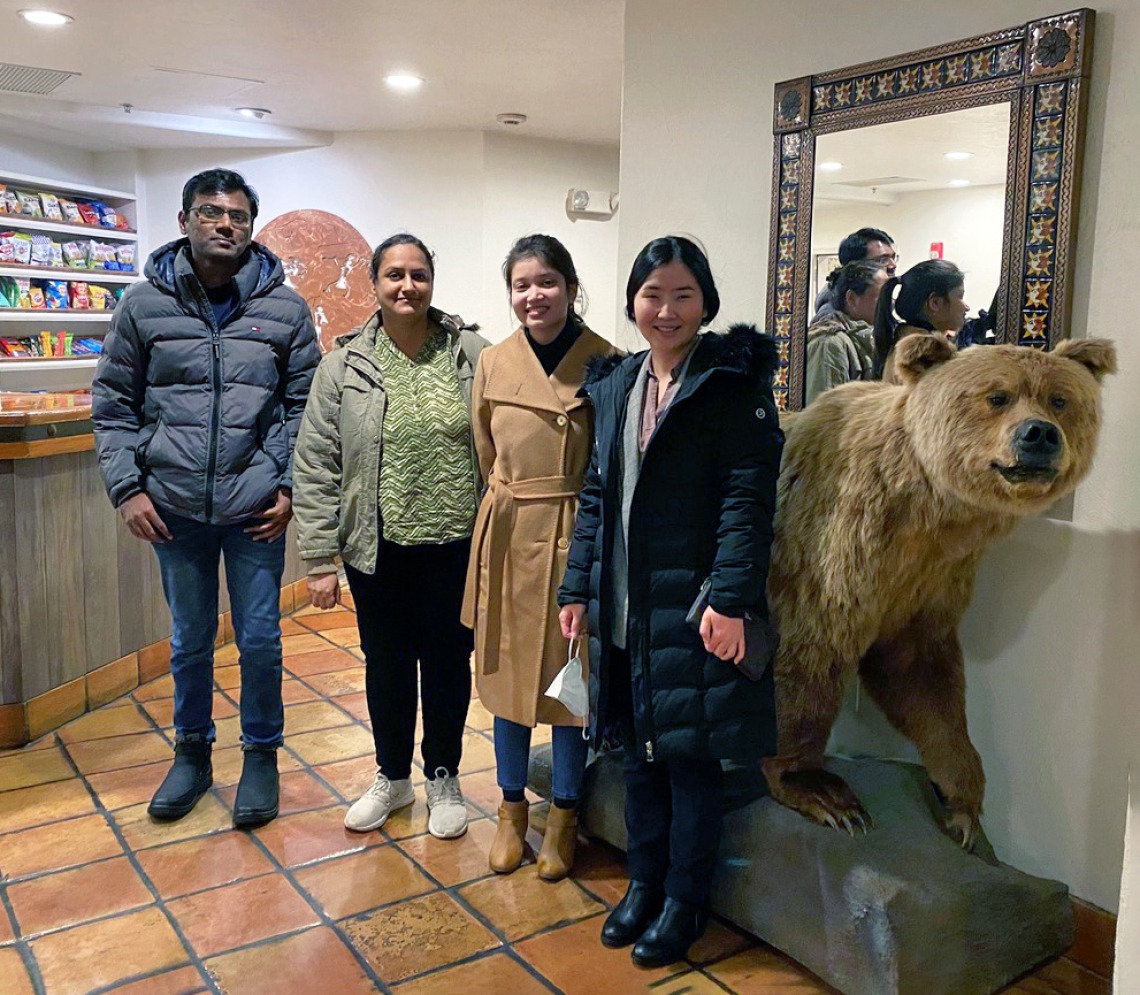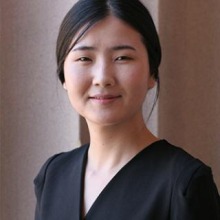Cross-cutting Research: Innovation in the Recycling of Critical Materials, a profile on Hongyue Jin

Hongyue Jin (far right) at CMI Winter Meeting.
In the fast lane toward global clean energy, Crosscutting Research in critical materials is at the intersection of innovation and collaboration. At the University of Arizona, Hongyue Jin is at the helm of the cutting-edge discipline.
“Crosscutting Research is important because it will help accelerate the development of sustainable technologies and secure the supply chain for rare earth elements and other critical materials so we can protect the future,” said Jin, who is Deputy Lead of Crosscutting Research Focus Area at the Critical Materials Institute (CMI) funded by the United States Department of Energy (DOE).
Established in 2013, the CMI is a DOE Energy Innovation Hub that works closely with national laboratories, industry and 15 educational institutions nationwide, including the University of Arizona.
CMI research centers around rare earth elements and a range of other minerals and “critical” materials such as cobalt, lithium, indium, gallium, and tellurium. These materials are essential for the production of high-performance magnets, batteries and electronic components utilized in clean energy technologies. Many of the
materials also have wide-ranging applications in consumer electronics, household appliances, lasers, medical and industrial processes.
“This is vital research for two reasons: One is the importance to clean energy. These critical materials go into clean energy products such as electrical vehicles, wind turbines, solar panels, energy storage systems, and high performance machineries. The second aspect is the reliance on foreign countries,” Jin said.
According to the 2022 U.S. Geological Survey, America depends on foreign sources for at least 50 percent of its mineral needs, with 81 percent of critical materials sourced from other countries.
“These materials are important, but we don’t produce enough to meet the growing demand. There has been a significant volatility in terms of supply and price for some of the critical materials the U.S. has been able to secure. Production technologies have not always been efficient and the conventional technologies that we rely on may not produce a sustainable supply,” Jin said.
Crosscutting Research: Generating Critical Resources for Clean Energy

Jin emphasized that past supply chain disruptions and uncertainties necessitate development of a resilient domestic supply chain in critical materials.
“At CMI, we are looking at developing sustainable processes and technologies that can produce these materials with less cost and more environmental friendliness,” said Jin.
As co-principal investigator on the CMI Project, “Optimizing the economic performance of CMI Technologies,” Jin’s role involves techno-economic analysis, environmental life cycle assessment, and optimization for sustainable supply chains.
“Economic analysis will help us understand whether the technologies developed for critical materials will be economically viable if commercialized. We will identify the major roadblocks for new technologies to become implemented in business and also quantify and improve the environment life cycle impacts, including whether we are introducing more greenhouse gas emissions,” said Jin.
Securing the Domestic Supply Chain
Working toward a sustainable future has been a priority for Jin since she was a child.
“I never imagined working in critical materials, but in the large scheme of things I always wanted to do something that could help people and the environment. Through my research and collaborations, I hope to help with development of sustainable technologies that are feasible in the commercial market and have a smaller environmental footprint so we can live all together in a sustainable environment,” said Jin.
She received both a B.S. and M.S. in Industrial & Systems Engineering from the Korea Advanced Institute of Science & Technology (KAIST) in Daejeon, South Korea. She began studies in strategies for recovery of rare earth magnets at Purdue University, where she earned a Ph.D. degree in Industrial Engineering prior to finding a unique opportunity in Systems & Industrial Engineering with the University of Arizona College of Engineering.
“I found the department culture fits me very well. It is a welcoming environment that is very supportive of the research that I do,” Jin said. She also appreciates the access to collaborative research through CMI.
Innovation and Inspiration
Jin’s recent work has involved exploration of different approaches to recycling hard disc drives for extraction of rare earth elements.
“For example, we can dismantle the hard drive and reuse the magnet component or repurpose the magnet into a different motor design, or extract the magnet and create a new magnet or recycle it into rare earth materials like oxides and metals,” said Jin.
Collaboration with industry partners has also included work to optimize new technology for recycling lithium-ion batteries.
“We are evaluating the environmental lifecycle impacts to see what will be the most environmentally taxing process and seeking alternatives to make the process more sustainable,” she said.
Moving forward, Jin hopes to inspire students to consider the abundant career opportunities in emerging technologies and mining, as the world transitions from a fossil-fuel based economy to a clean-energy economy
“Based on the current market projection, we anticipate the demand for several critical minerals will outpace supply in the next 30 years and longer. There is great demand for researchers and a skilled work force and that will keep growing. I hope our collaboration with CMI and the School of Mining & Mineral Resources will help attract more students and train them for work in this industry,” Jin said.
Jin will also be speaking at MINEXCHANGE 2023.
ENVIRONMENTAL: GREEN MINING I
Electrochemical Bioleaching of Critical Minerals from Spent Lithium-Ion Batteries
Speakers: C. Barboza, M. Alipanah, L. Aldana, Y. Fujita, H. Jin, V. Thompson and D. Reed

